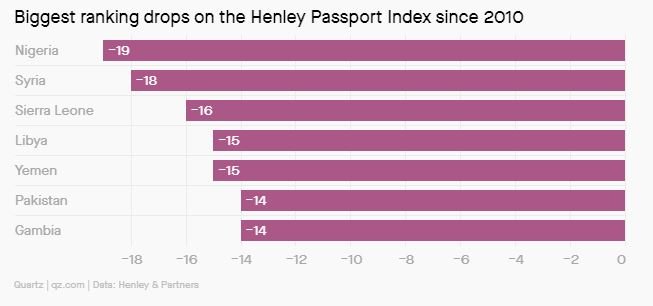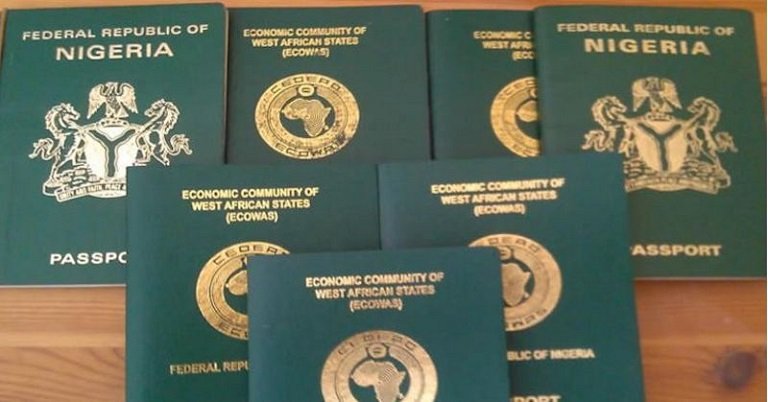The Nigerian passport has been ranked among some of the weakest in the world.
Although Nigeria is regarded as Africa’s largest economy, the Nigerian passport suffered the worst decline in rankings on the annual Henley Passport Index.
Analysis of the details of the 2020 Henley Passport Index ranking released on January 7th showed that Nigeria tied with Djibouti for the 95th position, providing access to 46 countries.
In the last report released in the fourth quarter of 2019, the country’s passport maintained the same position alongside Djibouti and Myanmar.
In the last decade, the Nigerian passport has recorded a significant drop on the index.
The decline in passport power now sees Africa’s most populous country rank 95th—firmly etched in the bottom quarter of the rankings.

The drop in rankings also means Nigerian passport holders can visit two countries fewer now than they could in 2010 without first obtaining a visa.
The Japanese passport ranks number one in the world with access to 191 countries across the world. Singapore passport is second with access to 190 countries.
South Korea and Germany are joint third with access to 189 countries. Italy and Finland are fourth while Spain Luxembourg and Denmark are fifth with access to 187 countries.
Sweden and France are sixth while Switzerland, Portugal, Netherlands, Ireland and Austria are joint seventh with access to 185 countries.
United States, United Kingdom, Norway, Greece and Belgium are ranked number eight with access to 184 countries.
New Zealand, Malta, Czech Republic, Canada and Australia are jointly ranked number nine.
The tenth spot is filled by Slovakia, Lithuania and Hungary.
Henley Index
The Henley Passport Index is the original ranking of all the world’s passports according to the number of destinations their holders can access without a prior visa.
The ranking is based on exclusive data from the International Air Transport Association (IATA), which maintains the world’s largest and most accurate database of travel information and enhanced by continuous research by the Henley & Partners Research Department.
In some cases, passport power is affected by local conflict and security fears as seen in the cases of Libya which has dropped 16 places since 2010 and Mali which has dropped 13 places.
Generally, the decline in the power of African countries is largely because countries in other regions are easing travel with reciprocity and boosting the strength of their passports at a much faster pace.
While Henley & Partners, the residence and citizenship consultancy that collates the index, notes a “substantial increase in the number of countries an average individual can visit without needing to get a visa in advance,” it also admits much of the progress on this front is firmly skewed towards holders of passports of developing countries. As such, the firm says the current global mobility gap is the “starkest” ever since the inception of the index.
Without the luxury of visa-free travel or even receiving visas on arrival, traveling abroad comes with the hurdle of expensive, paperwork-intensive visa application processes for a majority of holders of African passports.
But most applications are likely to be met with rejection—sometimes without just cause: a joint All-Party Parliamentary Group report from British lawmakers in August showed Africans are being unfairly denied UK visas.
The real-life implications of difficult visa processes for Africans range from being unable to visit family members abroad to scuttling higher education plans. Up to 75% of African students who applied for study permits in Canada between January and May 2019 were rejected— far higher than the global rejection rate of 39%.
One easy way for African countries to boost the strength of their passports is by easing visa regimes on the continent. Yet, progress in easing travel between African countries remains slow-moving: 49% of countries on the continent offer neither visa on arrival nor visa-free travel to other African visitors.












2 Comments
What a great idea! I appreciate all of your efforts! You’ve made it! Your capacity to work on a variety of themes. I’m impressed with the way you handle your articles and the effort you put into them. On concepts, you truly went above and beyond. You’re doing a fantastic job with your tasks and role. Keep it up.